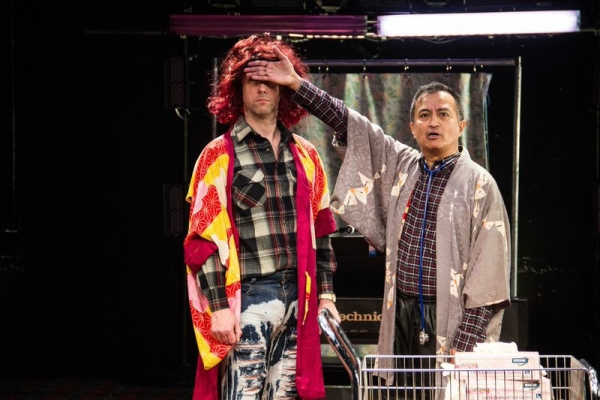Sorry Robot
Downtown theater artist Mike Iveson makes his playwriting debut with a futuristic addition to the 2015 COIL Festival.

(© Talya Chalef)
The narrowing gap between artificial and human intelligence began trending long before Siri became a friendly ear for the socially impaired. The increasing sophistication of technology has simply moved our collective imagination from task masters like Rosie the Robot to empathic partners like Samantha in Her. Still, questions about the emotional capabilities of machines and their place in human society are far from settled, leaving the door wide open for more artists to put in their two cents. Mike Iveson, who makes his playwriting debut at Performance Space 122's 2015 COIL Festival, inserts himself into this discussion with Sorry Robot — a sci-fi-infused musical farce peppered with emotionally ambitious androids. Inanity, however, overtakes the erratic piece, which translates to the stage as more of a loud peacocking intruder than the unique participant in this ever-evolving conversation.
Will Davis' direction of Sorry Robot takes satire to such a level of flippancy that at times it's unclear whether a sincere perspective on the topic is even a goal. Set in dystopian Florida, Iveson places us in a world where robots have become the ultimate personal assistants: running errands, taking phone calls, and transcribing emails — though they still make their fair share of errors per their specifically designed programming, as their creators take solace in the human flaw of…well, having flaws. Even manufactured defects, however, can't stop these automatons from contriving a plot to overpower their organic masters.
Anthony R. Brown leads the cast as Detective Isaac Crownover, the story's proclaimed "hero"— though his circumstances keep a pretty firm grip on him throughout the entirety of the play's ambiguous conflict. As he dictates an e-mail to his ex-wife in the opening scene through his robot Junius (played by a sufficiently robotic Iveson), his anxiety surrounding the task hints at a few personal skeletons that we expect to be dusted off later down the line. This figure from his past does resurface in a series of phone calls — this time communicated through a robot named Fortnight (more manically performed by the charismatic Nicky Paraiso) — but neither the relevance nor the resolution of that relationship is ever truly clarified. Instead, Iveson gets lost in the plot that unfolds inside the Hotel Vander Vivian — a Florida establishment now doubling as a software-development facility. Here, Isaac must determine whether robots are ready for an emotional-upgrade plug-in that will bring them one step closer to true humanity — a development by Dr. Kelvin Capp whose stereotypical scientific stoicism is spoofed by a deadpan Tanya Selvaratnam.
Although abstractly rendered by set designer Parker Lutz (who is also responsible for the abundance of athletic shorts and New Balance sneakers in his double duty as costume designer), the bed wedged in the corner and the lone coat rack that occasionally hides a chorus of scampering uniformed dancers lend the space a Rocky Horror air of quirky mystery. Lighting designer Lucrecia Briceno's bright flashing bulbs at the back of the stage contribute the most to this aesthetic.
Yet as locations shift and performers double or even triple up on characters, the nonspecific set and costuming becomes problematic at a basic storytelling level. At points, it's difficult to distinguish robot from human from robot-playing-human — an all-too-frequent occurrence as the machines perform absurd vignettes that demonstrate their advanced emotional capabilities. These are often followed by turns at the keyboard and various handheld mics to sing Iveson's compositions, which, rather than incisively poking fun at the human condition, become mind-numbing loops of humorless lyrics ("Tears on the treadmill" and "I've got feelings" are two of the score's most abundant phrases). In an interview with the New York Times, Iveson himself described the experimental venture as "an allegory for something, but I don't know what." Unfortunately, that was the only thing Sorry Robot made abundantly clear.








